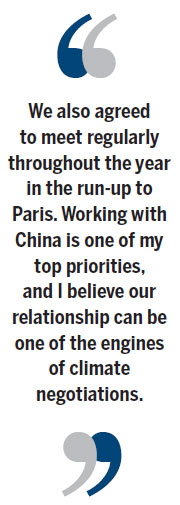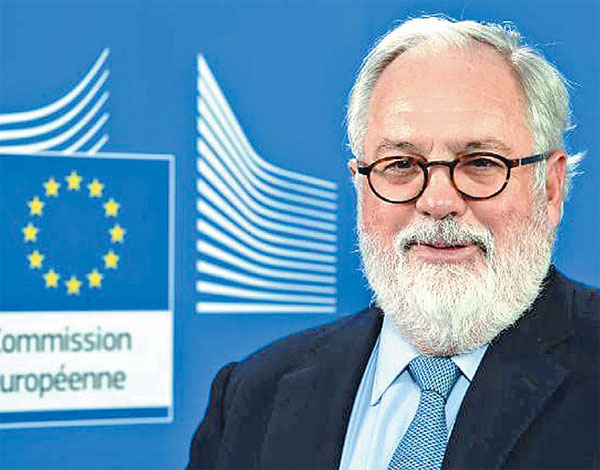EU and China 'need to compromise'

Bilateral summit will help both sides make Paris conference a success, EU commissioner says
The European Union commissioner for climate action and energy says the greatest threat to future generations is neither terrorism nor the so-called Islamic State of Iraq and the Levant but climate change.
Miguel Arias Canete also says the EU is ready to work with China to tackle global warming.
| Miguel Arias Canete, the European Union commissioner for climate action and energy. |
The Spanish-born official also appealed to other countries to come forward with their pledges to cut emissions as part of the global deal in the first quarter of this year.
Canete was speaking in the wake of "lengthy and detailed" discussions in Brussels about the climate negotiations with Xie Zhenhua, vice-chairman of the National Development and Reform Commission and China's lead climate negotiator.
This year marks the 40th anniversary of the establishment of diplomatic relations between the EU and China and Canete says "climate diplomacy" will be "at the heart" of cooperation between the two sides this year.
The EU-China summit later this year, he says, will be a great opportunity for the EU and China to "reaffirm our commitment" to make the Paris climate change conference in December a success.
"But the dialogue between our two countries on climate runs a lot deeper than the few major events we have planned throughout the year," he says.
Canete, who was appointed last year and whose tasks include implementing the EU 2030 climate and energy framework, says that in the recent meeting with Xie, they talked about the timing and contents of Chinese and EU contributions to the UN deal, and what the final agreement should look like.
"We also agreed to meet regularly throughout the year in the run-up to Paris. Working with China is one of my top priorities, and I believe our relationship can be one of the engines of climate negotiations."
The historic US-China climate agreement in November has sparked optimism on climate change cooperation between developed and developing countries. Canete says he shares this sense of optimism, adding, "I am optimistic, yes, but not complacent".
It was very encouraging that the United States and China followed "the EU's lead" in announcing long-term climate targets, he says.

China's 8.2 billion tons of carbon dioxide emissions a year are more than four times India's total, but Beijing has pledged, as part of the Copenhagen voluntary commitments in 2009, to reduce its carbon intensity by 40 percent to 45 percent by 2020, compared with 2005 levels.
Last October, the 28 member states of the EU collectively committed to a fully transparent, legally binding target of at least 40 percent reductions in greenhouse gas emissions by 2030.
"Now that the US and Chinese have followed suit, together we have provisional pledges covering 50 percent of the world's emissions," says Canete, a former member of the European Parliament.
But he cautions that there is still a "lot of work" to be done, adding: "We should build on this progress, and all countries should now work on their formal submissions to send to the UN as early as possible".
The EU, China and the US together account for more than half the world's emissions, which he says will allow other countries to "look to us three for leadership".
But all of the major emitters are important, he says. "It's not just the EU, China and the US that matter; a deal must be global, not just an agreement between two or three countries or groups."
He highlights the fact that the G20 countries account for 75 percent of the world's emissions, reinforcing his belief that "high ambition" is needed from "each and every one" of these countries.
Every G20 country should be in a position to come forward with their pledges as part of the global deal in the first quarter of this year, says Canete, a former Spanish government minister for agriculture and environment who will serve a five-year term in Brussels.
In the deal reached last year, China pledged for the first time that its emissions would peak by 2030, but Canete thinks it may still be difficult for China to wean itself off coal, its biggest source of energy.
"There is no question that phasing out coal, the most polluting of fossil fuels, will be a challenge for China, as it is for all countries. It will be important for China to focus on other low-carbon technologies including solar, wind and nuclear, which is why the commitment to reach 20 percent of low carbon energy by 2030 is an important step."
The EU, he argues, has also faced the challenge of phasing out coal, a fuel that used to "coat our cities in layers of pollution".
"Although we have made much progress in reducing our coal dependence, we still do have a way to go, and we understand how difficult the challenge is. We are ready to work with China and share our experiences."
Canete agrees with US President Barack Obama, who in January said the greatest threat to future generations is neither terrorism nor ISIL but climate change.
"I commend President Obama for saying it. UN Secretary-General Ban Ki-moon has also called climate change the 'defining challenge of our age'."
"Humanity has faced many threats throughout the ages. When I was young, everyone was worried about nuclear war. Now I have no doubt that the greatest threat facing us is climate change. The International Panel on Climate Change has warned us of the catastrophic effects of failing to act. If we fail to keep global warming to below 2 C, future generations will pay the price."
There will be two EU-China summits and the Paris conference this year. There will also be working conferences in Geneva next month and in Bonn in June of the UN Framework Convention on Climate Change.
Canete is hopeful that the EU, China and other world powers can achieve something significant at these various events and disagrees that past such events have been a failure.
"Over the past few years, we have laid the groundwork for a deal in Paris this year.
"The EU has been building bridges to other blocs for years. Together we have helped to rebuild a sense of trust that has been lost in these negotiations. Each of the events you mention will be important this year for overcoming the last few obstacles to an ambitious deal."
The EU and its member states will be pushing for climate change to be at the top of the agenda in many other international forums, including the meetings of the G7 and G20 as well as the Major Economies Forum.
This, he says, will provide "more opportunities" for the EU, China and other major world powers to work closely together in the run-up to the Paris conference, which aims to reach a legally binding, international climate agreement.
"The meeting will be crucial. However, by the time we get to Paris, we should be putting the finishing touches to the deal, not going back to the drawing board. The rest of this year, therefore, will be crucial."
Looking ahead to Paris, he says all parties, including the EU and China, "will have to make compromises".
"If we leave this to the last moment, we will not end up with the ambitious and fair deal that both China and the EU want, and the people of the world deserve."
As befits a great economic power, China has taken a leading role in tackling climate issues in recent years, and Canete praises the Chinese contribution to cutting global greenhouse gas emissions and also global energy sustainability.
"China and the EU are two of the largest global investors in low carbon technology, pioneering the technology that will in turn help the rest of the world.
"The biggest step China has taken though is setting a peak date for its emissions. This is absolutely vital for getting a global deal on climate change."
China has also pledged to explore whether an earlier peak might be possible, he says.
"We are working to support our Chinese partners to see if this might be achievable. An earlier peak date by China would help to drastically increase the level of global ambition."
For China Daily
(China Daily European Weekly 03/13/2015 page23)
Today's Top News
- Japan tempting fate if it interferes in the situation of Taiwan Strait
- Stable trade ties benefit China, US
- Experts advocate increasing scope of BRI to include soft power sectors
- New engine powers cargo drone expansion
- China to boost green industry cooperation
- Manufacturing PMI rises in November































